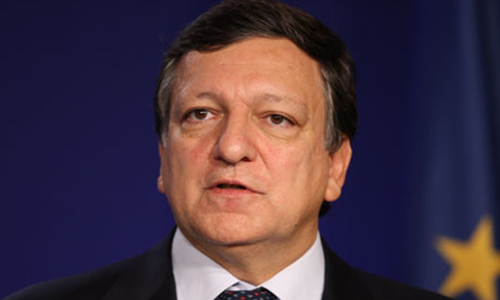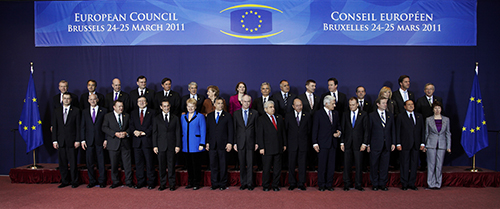by Ander Errasti López.
The Main Features and Relevance of the EU
In a time where the European Union’s future is full of uncertainty, its present is hardly understandable by the citizens and its role as a global actor is being constantly questioned (both by its own actions and by the international society), asking ourselves about the general importance of the union and the particular importance of the EU institutions for the Basque Country seems more relevant than ever. Nevertheless, in a period in which globalization appears to be an irreversible process and the traditional institutions of the modernity (mainly nation-state institutions, but not only) show their weaknesses or even incapability for dealing with global issues, asking ourselves how could a so tiny –in quantitative terms– people interact with such a huge and complex supranational institution as the EU is definitively inevitable.
In order to do so we should first address the main issues in which the EU plays a specific role as a political actor, this is to say, it makes an impact on the citizens subjected to its rules. We may summarize those issues in three main areas: Fundamental Rights Protection, Economic Progress and Political Union:
Regarding the first one, following the path of the European Court of Human Rights in Strasbourg, the EU has recently approved the Charter of Fundamental Rights of the European Union. This tool is, for the first time, a legal reference used by he European Union’s Court of Justice –with headquarters in Luxemburg– in order to harmonize the Fundamental Rights Protection at the EU level. Built around the idea of the inalienable human dignity, this implies protecting not only the rights to life, autonomy, physical integrity or non-torture (as some of the core Human Rights), but also non-discrimination in the workplace, freedom of speech and association for trade unions, media or demonstrations, as well as sexual freedom on highly sensitive issues such as adoption, marriage or abortion.
The second field in which the EU has an important role is the Economic Progress. When the first hybrids of the current EU were being developed, opening the trade channels among the Member States was considered a central instrument. It is important to underline the fact that it was a means, not an aim: the founding fathers considered that, after the experience of the Second World War, having an economic union will imply diminishing or even avoiding the tensions that led to the barbarie. In order to do so the Member States started a process in which first trades, then goods and services and finally people were free to walk around the EU. Even a single currency –although it does not apply to every Member State– was created with that aim. However, once the aim of peace was -at least apparently- granted, the EU maintained the idea of Economic Progress, although understood as a goal itself instead of a tool. The crisis that the EU is overcoming clearly shows, both before and now in its closing stages, that however relevant the economic progress might be, it should never be considered as a goal in and of itself, because, otherwise, the catastrophic consequences of the crisis (both in social and economic terms) would be bigger and even irreversible, especially in terms of generational loss.
Finally, with regard to the Political Union, although the EU is far from being a complete project in purely legal terms, it is undeniable that there is a political inter-dependence between Member States, which cannot be considered anymore fully sovereign political bodies in classical terms: when Germany, Great Britain or France make a decision on their job market regulation, it has immediate effects on the Italian, French or Basque job markets and vice-versa. The need of facing this reality with a formal progress on the Political Integration process while respecting the Member State’s Constitutional Identity seems as hard as necessary in the current framework. Solidarity, harmonization and co-decision require a kind of legitimacy which is absent in the institutional structures of the current EU, in the meanwhile going towards them has become an almost imperative goal.

Durao Barroso, current President of the European Commission, who will be replaced after the European elections on May 25
With these being the basic features of the EU and considering the relevance both of the aims and tools in the Union’s hands, let’s check the main tension that hinders the EU from making it fully viable: the clash between the need for further and better european integration and the relevance of respecting Europe’s intrinsic diversity, cultural and otherwise.
The Tensions Between Diversity and Integration
With respect to the three issues just mentioned, the tension between the urge of tackling together supranational challenges (migration fluxes, influence in international politics, efficiency in the action against global poverty, strength against merely economic interests, climate change, etc.) while keeping the diversity of the Union alive, is a constant matter. We can illustrate this issue by taking into account the three features already mentioned:
In the Fundamental Rights Protection debate this tension is exemplified with the need of ensuring universal coverage for the citizens at the EU while granting a scope of deference to the Member States so as to interpret those universal Fundamental Rights. This is to say; according to the decisions of Luxembourg’s Court whether banning homosexual marriage is against the fundamental right of sex freedom finds a different answer in Spain and Austria. In the meanwhile, the rights of not being tortured, having a family life or respecting one’s physical integrity have to be interpreted the same way all throughout the EU. The limits, scope and legitimacy of these different levels of protection still needs to be clarified, but its relevance is definitively unquestionable.
Regarding Economic Progress, the Crisis has shown that even if the EU was being built up perfectly to share the benefits in an almost harmonized sense, the way the Union has dealt with the losses has bore witness to the actual lack of integration. The way the sovereign debt crisis was addressed by the European institutions, especially in the case of the Greek fall, has evidenced not only a worrying lack of mechanisms but also the worst side of the European ethos: a certain kind of economic xenophobia among the Member States, mainly among the southern and northern states of the Union.
Finally, if we refer to the ongoing political union, the main clash takes place between those who consider that the only legitimate decisions are those taken by nation-state parliaments and those who consider that the only way of ensuring citizens’ welfare is by tending to a stronger integration, i.e., to a European State. The tensions on this particular issue are more and more frequent, the case of the failed Constitutional process or the reaction of several States to the EU Treaties reforms, show clear examples. In a more concrete sense, the fact that the Union is being incapable of bringing every Member State together to effectively confront the fiscal fraud clearly shows the unintended consequences of these tensions.
Given these tensions, we should now catch the initial inquiry and check why a people such as the Basque should consider this Union’s structures, with all their tensions and deficits, a relevant issue. Leaving aside both the legal fact that, as part of the Union, it seems hard to understand any Basque territory out of the EU and the empirical fact that nowadays, there is no way of becoming a fully sovereign state in the 19th Century sense, there are two relevant questions that the Basque people should face to show its relevance in the EU: what exactly does diversity mean in an interdependent polity and are the current nation-states safeguards of that diversity?
The Lesson from the Stateless Nations: the Basque Country Facing a Unique Opportunity
Without going through the political consideration of what should and will happen with the seven territories that form the current socio-linguistic and historical Basque Country, it is an actual fact that the Basque Country is a stateless people. Nevertheless, it represents a clear separate element of European diversity: despite its internal diversity (which is undeniable and unequally distributed all around the seven territories, of course), the Basque Country has several features that make it a unique cultural, linguistic, historical and social area in the European landscape. This is perfectly compatible with the internal diversity that, as in almost every people (not only in Europe, but in the world) has kept on growing. The question, therefore, should be: is diversity linked to nation-states, as the EU seems to understand? The answer, in my view, is definitively negative. In almost every European nation-state more than a single people live together in the same territory. Furthermore, most of those peoples are in cross-border situations, facing conflicts against the majority within those encompassing nation-states. So, then, when the EU is using the diversity argument in favor of safeguarding the will of the Member States, what exactly are they protecting? The evident reply is that they are basically protecting the political sovereignty of the States.
It is true that there are good arguments in favor of State’s sovereignty (mainly in terms of democratic legitimacy, historical justification and institutional efficiency). Besides, it is also a matter of power struggle, as the Member State’s own institutions have their own specific weight which makes it harder to introduce any change that may affect their role. However, the need of reshaping the institutional arrangement of the Union is pushing more and more towards a post nation-state Europe. The key question, therefore, is whether diluting the current Member State’s sovereignty (tending towards a combination of local governments and supranational governance) will imply a process of homogenization: the answer I consider more accurate in this case, paradoxically, is that it will depend on our understanding of diversity. If we understand diversity as the one prevailing Constitutional Identities currently in Europe, then it will eventually be diluted in the ongoing supranationalization process or will even force the rupture of the Union. If, on the contrary, the efforts tend towards a more region, nation or people based diversity (leaving aside the current political borders); the cultural, linguistic, social and even legal heritage resulting from the diversity will surely remain. Besides, this might imply a higher identification with the EU institutions, as they will no longer be considered a threat for the people’s autonomy but rather a political institution created by the peoples so as to deal better with their citizens’ needs.
The Basque Country, as a people with a clear will of remaining on their particularity while defending the need of supranational institutions such as the EU ones (not only now, but from the very beginning of the EU integration process), can be a valid example on overcoming the tensions between diversity and integration. Precisely because, already from the very beginning of the European project, we internalized that our persistence as a people will depend on a proper integration with other peoples; this is to say, away from any homogenizing pretension of the traditional nation-states. In a period in which the European project seems so endangered, paying attention to this perspective seems the only possible way out. Otherwise, with the pretext of protecting diversity, Member States will keep bargaining with EU institutions in a dead end conflict, pretending to be the only legitimate political actors and the sacred guardians of diversity. A view that has been already proved false and that the stateless nations or peoples (such as the Basque) can introduce into the European integration debate.
 |
Ander Errasti López is a PhD Candidate in Ethics and Political Philosophy – Universitat Pompeu I Fabra (Barcelona) and Globernance Researcher (Institute of Democratic Governance in San Sebastian) |
| @ander_errasti | |
| ander.errasti.lopez@gmail.com |








Be the first to comment on "The Basque Country in the European Union: Diversity Beyond the Nation-State"